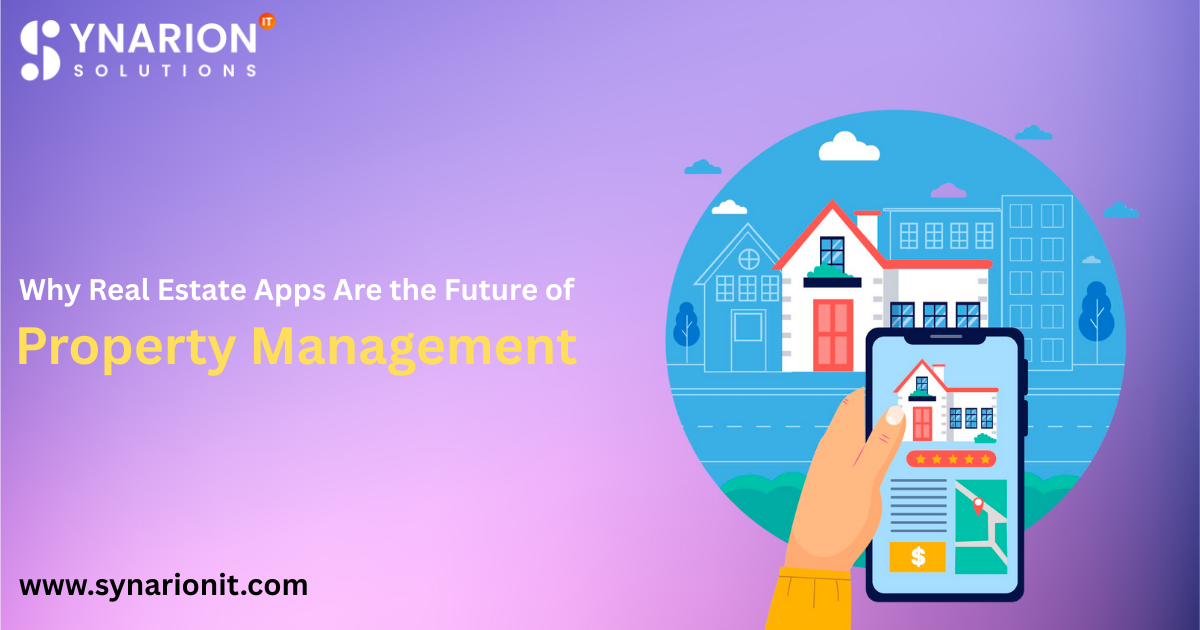Property management has always been a challenging field. From handling tenants and collecting rent to tracking maintenance and managing multiple listings, the process requires organization, efficiency, and time. Property management traditionally required managing records by hand, coordinating via calls, and meeting clients in person. But as technology has evolved, so has the way we deal with properties.
In recent years, mobile applications have revolutionized how real estate is managed and accessed. They’ve introduced speed, automation, and transparency into an industry that was once slow-moving. Today, real estate mobile apps aren’t just tools — they are becoming the very backbone of modern property management. Businesses, landlords, and even tenants now prefer digital platforms to simplify property-related tasks. This shift shows us one clear fact: real estate apps are the future of property management.
The Shift Towards Digital Property Management
The real estate sector has always been a cornerstone of economic growth, but it was slow to embrace digitization. For decades, property management depended on brokers, agents, and offline documentation. While effective to an extent, this approach created delays, confusion, and sometimes even mistrust.
With the rise of smartphones and high-speed internet, the industry began transitioning into digital solutions. Real estate apps offered something traditional methods couldn’t — convenience, transparency, and accessibility anytime, anywhere.
This trend is not slowing down. Global reports predict that the real estate app market will continue to grow rapidly as more property owners, managers, and tenants turn to mobile platforms for their needs.
Key Benefits of Real Estate Apps in Property Management
So why are real estate apps becoming indispensable for property management? Here are the biggest reasons:
1. Convenience and Accessibility
With a real estate app, tenants, landlords, and property managers can view and manage all property information directly on their mobile devices. Whether it’s checking property listings, paying rent, or scheduling a maintenance request, apps make it possible 24/7.
2. Automation of Routine Tasks
Rent reminders, lease renewals, maintenance tracking, and payment receipts can all be automated. This minimizes mistakes caused by manual handling and helps both tenants and property managers save valuable time.
3. Improved Communication
Real estate apps act as a direct bridge between landlords and tenants. Instead of constant phone calls or emails, communication happens seamlessly within the app. This allows issues to be addressed promptly, enhancing overall tenant satisfaction.
4. Data-Driven Insights
Property managers and investors benefit from smart analytics within apps. They can track occupancy rates, rent trends, tenant satisfaction, and maintenance costs. These insights support better decision-making and maximize returns.
5. Cost Efficiency
By cutting down on manual paperwork and streamlining operations, real estate apps reduce operational costs. This allows property owners to reinvest their savings in growth and improvements.
Must-Have Features in Real Estate Property Management Apps
A well-designed real estate app should come with powerful features to make it truly effective. Some of the must-have ones include:
- Property Listings & Search Filters – Helps users find the right property quickly.
- Virtual Tours & 3D Walkthroughs – Enables tenants and buyers to explore properties from anywhere.
- Online Rent Payments – Secure, fast, and hassle-free rent collection.
- Tenant Screening – Ensures only verified tenants are onboarded.
- Maintenance Requests – Tenants can raise requests directly in the app for quick resolution.
- Push Notifications – Alerts for rent due dates, maintenance updates, and new property listings.
- Secure Document Storage – Safe storage for lease agreements and transaction history.
These features not only improve convenience but also build trust between landlords and tenants.
How Real Estate Apps Benefit Different Stakeholders
One of the main reasons real estate apps are gaining traction is that they add value to everyone involved in the property cycle.
- For Property Owners/Landlords: Real-time access to tenant information, payment records, and property maintenance updates. They can manage multiple properties at once, making their job easier and more profitable.
- For Tenants: The process of finding, renting, or maintaining a property becomes smoother. From virtual tours to digital rent payments, tenants save time and effort.
- For Property Managers: Centralized control of multiple properties reduces workload and improves efficiency. They can monitor rent collections, tenant complaints, and maintenance tasks all in one place.
- For Investors: Access to property analytics, market trends, and ROI insights allows investors to make data-driven decisions and maximize profits.
Role of Advanced Technologies in Real Estate Apps
The future of real estate apps goes beyond just listings and payments. New technologies are enhancing these apps, making them more intelligent and effective.
- Artificial Intelligence (AI): Personalized property recommendations, chatbots for instant support, and predictive analytics for better investment decisions.
- Augmented Reality (AR) & Virtual Reality (VR): 3D property walkthroughs and virtual staging enhance the user experience.
- Blockchain: Secure and transparent property transactions, lease agreements, and document verification.
- Internet of Things (IoT): Smart homes and connected devices that integrate with property management apps to provide real-time updates.
By integrating these technologies, apps are moving from being just convenient tools to becoming complete digital ecosystems for real estate management.
Why Real Estate Apps Are the Future of Property Management
The growing reliance on real estate apps is no accident. These points explain why real estate apps are becoming essential moving forward.
- Rising Demand for Transparency: Tenants and owners want secure and clear processes. Apps provide real-time updates and eliminate middlemen.
- Smart Cities & Digital Transformation: Governments and businesses are pushing for digital solutions in urban housing, and apps fit perfectly into this vision.
- Scalability for Businesses: Real estate agencies and property managers can scale their operations using mobile apps without proportionally increasing costs.
- Preference for Mobile-First Solutions: In today’s world, most users prefer mobile over desktop. Real estate apps cater to this mobile-first behavior.
- Global Growth in Rental Market: With more people opting for rentals, apps simplify the process of property discovery, tenant verification, and rent collection.
All these factors show that real estate apps aren’t just a trend — they’re here to stay and will continue to grow as the backbone of property management.
How a Real Estate App Development Company Can Help
While the benefits of property management apps are clear, building one requires expertise. A professional Real Estate App Development Company can help businesses design, develop, and deploy apps tailored to their needs.
From choosing the right tech stack to integrating advanced features like AI, AR, and blockchain, an experienced development partner ensures that the app is not only functional but also future-ready. Moreover, they help businesses select the right monetization models, maintain app performance, and scale the solution as the user base grows.
For property owners, startups, and large enterprises alike, collaborating with a skilled development company is the best way to build an app that stands out in a competitive market.
Conclusion
The property management industry is undergoing a massive digital transformation, and real estate apps are leading the way. They simplify operations, enhance communication, improve user experiences, and provide real-time insights for better decision-making.
With the integration of emerging technologies like AI, AR, and blockchain, these apps are set to become even more powerful in the years ahead. For property managers, investors, landlords, and tenants, this means better efficiency, transparency, and convenience.
Businesses looking to stay ahead in this competitive space should consider partnering with a trusted Real Estate App Development Company to create apps that match market demands and future trends.


